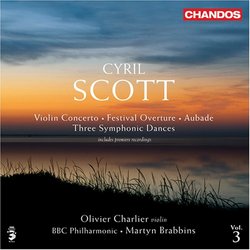Another winner in Chandos' Cyril Scott series ...
Classic Music Lover | Maryland, USA | 07/04/2007
(4 out of 5 stars)
"More good music-making in Chandos' ongoing survey of the music of Cyril Scott, who may have been an Englishman but who sometimes sounds like he came from another planet! Atmospheric, well-played, and for the most part interesting scores. The premiere recording of the Violin Concerto is a welcome addition, though I can't say I like it quite as much as Scott's concertante works for piano and cello. The Aubade and the Three Symphonic Dances (which began life as Scott's Second Symphony) were both recorded a number of years ago by Marco Polo and a South African orchestra. Maestro Brabbins and his orchestra are much more effective, and the recorded sound is superior to the Marco Polo CD.
If you already know Cyril Scott's music, you'll need no prompting to pick up this latest volume. If you're new to Scott, you know you'll like his style if you enjoy the works of composers like Szymanowski, Griffes, Scriabin or Sorabji. Rather than starting with this CD, you might go first with Volume 2 in the Chandos series, featuring an absolutely stunning reading of the Piano Concerto #1 -- possibly Scott's single best composition for orchestra."
Scott at his very best
Dr. Richard M. Price | London, UK | 04/14/2008
(5 out of 5 stars)
"Of all the pieces in the Chandos series of Scott's orchestral music it is the Violin Concerto that seems to me the most satisfying: its rich harmony and confidence of gesture are qualities common in Scott, but this work has the additional advantages of the brilliance of the writing for violin and of a concision of form that is all too rare in this composer - and to this is be added the extraordinary intensity of Olivier Charlier's violin playing. The sultry romanticism of the work, akin to that in the violin concertos of Delius and Szymanowski, appeared out of date when the work was first performed in 1928, but it is preciselythis feature that will captivate many listeners today. The rest of the programme on this CD is too miscellaneous to make the same impression, though the Aubade achieves a delicate magic and the early Symphonic Dances, while lacking the harmonic distinctiveness and subtle orchestration of later Scott, have great verve and are almost too easy to enjoy."


 Track Listings (9) - Disc #1
Track Listings (9) - Disc #1